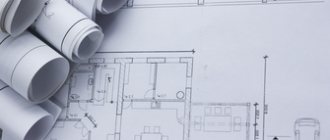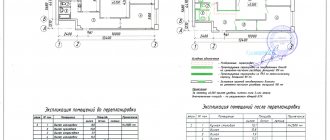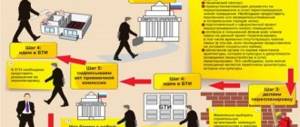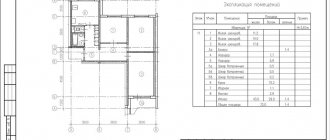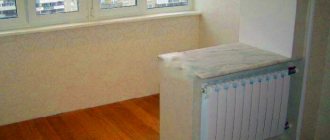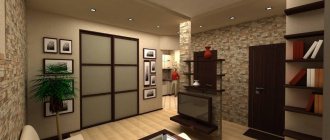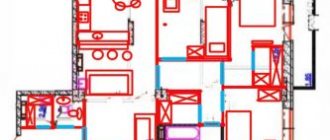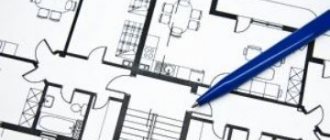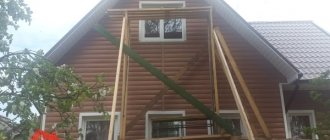Some repair or reconstruction work requires registration and registration. Before they begin, it is necessary to check that the planned activities are carried out in accordance with the law. Otherwise, there will be punishment from government agencies in the form of a fine.
In order to coordinate the redevelopment of an apartment as quickly as possible, it is recommended to contact commercial companies that have a license for such activities. This will help save not only your budget, but also your precious time.
What is considered redevelopment in an apartment that requires approval
When determining what is a redevelopment of an apartment and what is not, you should familiarize yourself with the legislative norms. Article 25 of the Housing Code stipulates that repair work related to changes in the location and configuration of premises are redevelopment. All this must be taken into account in the technical passport in accordance with all current rules, which will help to avoid subsequent controversial situations when buying and selling real estate.
To improve living conditions, some property owners and tenants carry out major renovations that involve moving the walls in the apartment. All these actions must be registered with the BTI. But many citizens do not want to fulfill such conditions, because the price for registration is about 2,500 rubles, and they will have to work on this matter for up to two months, filling out and collecting the necessary papers.
All this, as a rule, ends in considerable fines, and unauthorized redevelopment will have to be legalized in any case, because it will be impossible to sell such an apartment. Therefore, you should plan this procedure in advance, create a plan of all necessary measures and contact BTI representatives with them to coordinate the redevelopment of the premises.
Actions to change the housing configuration cannot be carried out in the following cases:
- increase the area of kitchen premises and bathrooms at the expense of the footage of living rooms (it is impossible to expand these elements of the apartment by more than 25% of the living space);
- combine kitchens with other living space using arched structures when the housing has a centralized gas supply (this is possible when apartment buildings are equipped with electric stoves);
- demolish load-bearing walls and partitions;
- dismantle or move engineering and technical communication structures (hot water and hot water pipes, radiators, ventilation ducts, openings);
- move the toilet and bathtub to areas of the apartment where residents have living rooms below (except for rooms with two tiers);
- move heating radiators or make a branch from the central system on balconies and loggias;
- increase the balcony space with the help of living space (you can combine them with arched openings that are no wider than a meter).
In addition to such prohibited measures, you should know that when overhauling, you cannot worsen the existing living conditions in apartments. In this case you can:
- combine the kitchen space (including with a gas stove) with the rest of the living space with installed doors, arched devices, sliding mechanical devices;
- increase the toilet and bathroom using corridors, but the level of flooring outside these rooms should be lower;
- move water and heating pipes from the riser, increasing their length, but leaving the same drainage angle.
Also, when carrying out reconstruction and major repairs, you should take into account the time of work (from 9.00 to 22.00 on weekdays and from 10.00 to 22.00 on holidays).
Redevelopment of an apartment according to the law
The main regulatory act regulating all processes and types of redevelopment is the Housing Code of the Russian Federation (Articles 25-28). The current Housing Code of the Russian Federation regulates the following points:
- Coordination and registration of housing redevelopment;
- Carrying out redevelopment on legal grounds;
- Streamlining the norms for apartment redevelopment;
- Responsibility for unauthorized actions regarding changes in the housing plan of the apartment.
Redevelopment of an apartment, according to the current law, involves configuration changes in the living space without manipulation of load-bearing walls and other supporting engineering structures. If changing the configuration of housing requires the transfer of engineering structures, sewerage, installation of an electric bus or autonomous heating, such actions are characterized as refurbishment of the apartment. Both redevelopment and reconstruction of residential premises require approval from the authorized bodies.
In order to familiarize yourself in detail with the nuances of redevelopment, you can download the text of the Housing Code of the Russian Federation with the latest amendments from the link:
The law establishing the procedure for redevelopment of an apartment in the capital of the Russian Federation is the Decree of the Moscow Government No. 73-PP dated 02/08/05 “On the procedure for redevelopment of premises in residential buildings on the territory of the city of Moscow.” The current text of this law can be downloaded from the link:
What changes can be made to the apartment plan by law?
According to the provisions of the Housing Code of the Russian Federation, the following changes can be made to the apartment plan:
- Combining the kitchen with the adjacent room by installing an additional doorway in the wall;
- Creating an open arch when connecting the kitchen to the room;
- Increasing the space of the bathroom and toilet due to the corridor area, provided that the floor level of the bathroom is 3-5 cm lower than the complementary area;
- Extension of a new pipe system to transfer the riser water tank, provided that the drainage angle is maintained;
- Balcony insulation due to glazing.
If the housing redevelopment process affects the common property of the residents, the procedure for making changes to the plan of a particular apartment must be agreed upon with each of the neighbors.
What is prohibited?
Redevelopment of an apartment should not negatively affect the living conditions of both the owners of this premises and their neighbors (Resolution of the Government of the Russian Federation No. 47 of January 26, 2006).
The changes made should not pose a threat to the life and health of citizens and contribute to the destruction and premature deterioration of the housing complex.
When carrying out redevelopment or reconstruction of housing, it is prohibited:
- Demolish load-bearing structures or disrupt the stability of load-bearing walls;
- Increase the area of the kitchen or bathroom at the expense of living rooms;
- Combine a room with a kitchen in which there is a gas stove;
- Demolish or disrupt the operation of communal radiators and adjacent pipes;
- Arrange a bathroom in a place where the neighbors below have a living room (in the case of one-level apartments);
- Provide floor heating using general heating;
- Expand the balcony at the expense of living rooms (with the exception of forming an arch up to 1 meter wide);
- Carry out measures to renovate apartments in dilapidated buildings;
- Disturb the operation of the ventilation systems of the house;
- Construction of attics;
- Reconstruction of attic floors.
For any changes to the kitchen plan, there must be a window in the specified room. This is necessary for lighting and natural extraction of harmful fumes generated during cooking, as well as to prevent the consequences of gas leaks.
What does not require approval
The following activities do not require registration:
- gluing various wallpaper coverings, painting ceiling and wall structures;
- installation and replacement of furniture elements, this also applies to built-in models;
- change of plumbing equipment, heating appliances, any work on balconies and loggias;
- installation of air conditioners and antenna masts from the street;
- rearrangement of kitchen stoves and their replacement;
- installation of door structures and partitions that will not put pressure on the overlapping elements;
- demolition of non-load-bearing wall structures and vestibules;
- equipment of openings in non-load-bearing wall structures.
All this can be done without permission. Confirmation for repair work is required when making major changes: moving or demolishing the load-bearing structures of the house. Then it is necessary to prepare a project and obtain permission for construction work. Coordination of the redevelopment of load-bearing walls is required. During illegal redevelopments that have not received approval from specialists, the load on the load-bearing walls may be disrupted, which is fraught with the appearance of cracks in them, and sometimes the collapse of multi-story buildings.
Redevelopment of an apartment: what can and cannot be done without approval
Chapter 4 of the Housing Code of the Russian Federation is devoted to consideration of issues of making changes to the internal configuration of the apartment, which should be approved by the Housing Inspectorate.
The following work is allowed to be carried out in the apartment without approval:
- redecorating;
- glazing of balconies;
- installation of air conditioners and outdoor antennas;
- changing plumbing equipment without changing its location.
The list of prohibited works is specified in Appendix No. 1 of Resolution No. 508-PP dated 10/25/2011 (Article 11). These include all measures aimed at deteriorating the operation of the building:
- violation of the integrity of load-bearing walls;
- transfer of a living room to non-residential premises;
- any changes in ventilation ducts;
- moving the battery to the balcony;
- combining a living room with a room where gasified equipment is located;
- connecting the heated floor to the general heating system;
- Converting an attic or basement into living quarters.
What does not require permission?
Those actions that do not affect the increase or decrease in the area of individual premises of the apartment do not apply to redevelopment work:
- changing wall or ceiling coverings (painting or wallpapering);
- replacement of floors: linoleum, parquet, laminate;
- rearrangement of internal doors;
- dismantling of non-load-bearing partitions;
- sealing openings in load-bearing walls;
- change of plumbing;
- replacement of heating elements;
- moving gas equipment: stoves or columns;
- Replacing gas stoves with electric ones.
What work is considered redevelopment
A complete list of work to make structural changes is provided in Appendix No. 1 of Resolution No. 508-PP dated 10/25/2011 (Article 2.2):
- moving existing partitions indoors to expand the area of the room, kitchen or bathroom;
- combining several apartments into one without violating the integrity of load-bearing floors;
- connection of a living room with a balcony;
- installing partitions to make one room into two.
The total living area should not decrease during apartment redevelopment.
What are the dangers of illegal redevelopment?
All unapproved modifications in the residential premises of an apartment building must be legalized, because unregistered re-planned activities will lead to the following consequences:
- fines for illegal redevelopment. According to the Administrative Code, all violators will be subject to monetary sanctions from 2 thousand to 2 thousand 500 rubles. In addition, unauthorized redevelopment will lead to the mandatory return of the residential premises to their previous form. If this is not done within the prescribed time, then legal liability will follow in the form of selling the apartment at a trade auction with compensation payments. Social contract renters face eviction and contract termination;
- a ban on various real estate transactions, in particular the sale of an apartment with unauthorized redevelopment;
- Unauthorized repairs cannot be carried out, as this threatens emergency situations that may lead to destruction of load-bearing walls and ceilings, floods and other harmful results of illegal work.
When purchasing an apartment, it is recommended to check the premises and documentation in order to avoid unpleasant situations regarding unauthorized repairs.
IMPORTANT! The main structures of an apartment building, internal load-bearing walls and columns are the foundation of the house. Consequently, the replacement and demolition of these elements of the apartment cannot be arbitrary. By illegally carrying out major home repairs, there is a risk of not only fines - it threatens the structure of the entire house.
Where to complain
If you suspect violations of the supporting structure of the house, you should visit the Housing Inspectorate at the place of registration of the property. If during the inspections it is determined that the culprit does not have the necessary documents to carry out the redevelopment, the information is transferred to the prosecutor's office or court, where they will impose a fine and demand that everything be returned to its original state.
When changes concern buildings that are registered as cultural monuments, then you need to contact architectural supervision. After registering the application and the absence of specific actions, you can safely complain to other local government institutions, and then to the courts. In small villages, you should contact local administrative organizations.
Coordination of redevelopment
When applying independently, the legalization of apartment redevelopment is agreed upon in several stages:
- obtain administrative permission to carry out the reconstruction of residential and non-residential premises. The procedure begins with the collection of documents to government agencies that are located at the place of registration of the property in a new building or an old building. Such bodies may be the Housing Inspectorate and the Capital Construction Department. If all the papers are prepared and there are no questions about the order of paperwork, then you need to contact the multifunctional center immediately, which will significantly save effort and time;
- order design documentation or prepare a reconstruction plan yourself. Project documents are prepared by specialized companies that have legal permission for this work from government agencies. Based on a sketch made independently, you can get consent, but not always. It only allows for the demolition of non-load-bearing walls or work that will not lead to changes in the design of utilities;
- the next step will be to submit the collected documents to the authorized organization - the Housing Inspectorate;
- obtaining the consent of the competent structures for changes in accordance with the acts. The time period for consideration and receipt of an agreed project can last up to 45 days. An additional three days are provided for sending the decision to the applicant;
- After receiving permission, you need to redirect it to the BTI in order to correctly record and formalize the changes.
Home renovation procedure
When making a decision to renovate an apartment, if necessary, it should be done properly, in compliance with legal procedures in order to maintain safe living conditions both in the owner’s home and in the entire residential building.
The procedure for redevelopment is as follows:
- collection of necessary documents;
- approval of a future project or plan and obtaining permission for its implementation;
- carrying out specified work;
- handing over the work and issuing the corresponding acceptance certificate;
- obtaining a new residential premises passport from the BTI;
To renovate an apartment, the following documents are required:
- application for permission to carry out redevelopment;
- registration certificate of the dwelling;
- documents confirming ownership;
- approved project or sketch of future changes;
- written consent of all residents registered in the apartment or its owners, if there are several of them;
To draw up a sketch or plan for future changes, it is recommended to contact the architectural department of the district administration or a design and construction company. In these institutions, the customer will not only draw up the necessary project, but will also provide the necessary advice on making certain changes in the apartment design.
After collecting and approving the necessary documents, you need to contact the housing inspectorate to obtain the appropriate permission to carry out repair work. After approval of the project, it is necessary to complete the required actions within the prescribed period and hand over the completed work to an expert from the housing inspection, who will draw up and sign the corresponding act. With this document, the owner must contact the BTI to obtain a new technical passport for the home.
Allotted time frame
Permission to carry out redevelopment work is issued within 45 days from the date of submission of all documents, provided that all papers are filled out correctly, otherwise this process may drag on indefinitely due to the need to redo the documents.
The actual redevelopment work in accordance with the approved plan must be carried out within 4 months from the date of receipt of the appropriate permit. Repair times are set in accordance with the law on silence, namely on weekdays from 9 to 19 hours with a lunch break.
Repanning an apartment located in a new building can only be done 3-4 years after the house is put into operation, after the building has acquired the appropriate status.
How to legalize changes made to the apartment plan?
If the redevelopment was carried out independently, without obtaining the appropriate permission, it must be legalized, otherwise administrative liability will arise.
To approve unauthorized redevelopment, you must contact the BTI or the housing inspectorate, having first collected the following documents:
- technical passport of the home;
- documents confirming ownership;
- apartment plan before changes are made;
- house plan with modifications;
- statement;
The authorized bodies will conduct an appropriate examination, checking the actual result with the data provided, and then approve the new plan. However, you will still have to pay a fine of 200 to 2500 rubles, depending on the volume of changes made.
If the BTI and the housing inspection refused to approve the redevelopment, the repair can be legalized through the courts. To do this, you need to add to the above package of documents a certificate from their authorities, which was refused in the procedure for approving a new plan, after which, after paying the state fee, send the documents and wait for the trial. The package of documents can be supplemented with any additional papers that can confirm the owner’s position that he had the right to carry out redevelopment.
Where does registration take place?
Registration of apartment redevelopment must be carried out at the BTI, Housing Inspectorate or municipality. Papers are sent there for approval and issuance of a new plan, where all changes made will be recorded. To do this, employees of this organization come to the site, and the necessary act is drawn up.
If there is no refusal, then at the next stage you need to contact the organization again, they will issue a new passport. After this, you need to visit Rosreestr to make modifications.
Through the court
Reorganization can be legalized through the courts if the competent authorities refuse. They file a statement of claim in which they demand either to challenge the decision or to preserve the changes made to the property.
To approve changes in court, the following documents will be required:
- receipt of payment of the fee (300 rubles);
- title documents for residential premises;
- documents from the BTI;
- design documentation;
- final assessment of authorized bodies;
- permission from the design institution;
- other documents substantiating the legality of legalization;
- statement (samples of statements of claim can be found on stands in court).
The process will be followed by either a refusal or confirmation of the legality of the redevelopment. The decision will come into force in 30 days. If the court's decision is positive, you should visit the BTI to make changes to the registration certificate of the home.
How to legalize an already completed redevelopment of residential real estate - step-by-step instructions
Follow these instructions to properly legalize the redevelopment of an apartment or home:
- Step 1. Collect a documentation package. Without documents, your application for project legalization will not be considered.
- Step 2. Contact the BTI. Ask for a registration certificate.
- Step 3. Order a redevelopment project and a technical conclusion for it from the design company. Please note that the organization must have a license and rights to provide this service.
- Step 4. Approval of the project by supervisory authorities. Such structures are: the housing inspection, the department for capital construction under the administration of the city or district, the Ministry of Emergency Situations, the sanitary inspection station.
- Step 5. Obtain the opinion of the housing commission. If permission for the facility is not issued, then the issue will have to be resolved in court.
Please note that all changes will be made to documents confirming property rights and BTI documentation.
If planning has already been done
If there is an unauthorized transfer or demolition of main walls, then it is necessary to immediately prepare design documentation and coordinate the project with the Housing Inspectorate. Unauthorized redevelopment of an apartment is legalized in the same way as during the initial application. It will only be necessary to pay a fine for illegal redevelopment to legalize it. Housing experts advise agreeing on renovations as if they have not yet been completed. In this case, there will be no threat of a fine. But this is only possible with minor changes in the apartment.
When a thorough redevelopment has already been made to the premises, which affected, for example, load-bearing wall structures, then legalization in this way will not be possible, because a visit from a housing inspector is inevitable.
To complete the procedure, you must first submit an application to the Housing Inspectorate. Then you should collect the following list of documents:
- title certificate for housing;
- written confirmation of all registered residents;
- BTI plan and technical passport;
- change project;
- decision on the safety of the reconstruction carried out in an authorized organization.
In about a month, a verdict will follow, with which you need to contact the Housing Inspectorate when the permit is issued. An inspecting employee who arrives after a set time will inspect the apartment for compliance with standards and issue an act, after which the reconstruction will be legalized. For violation, a fine of 2 thousand to 2 thousand 500 rubles will be imposed. Then you should visit Rosreestr with a technical plan, legal documents for housing, a BTI plan and the consent of authorized authorities for redevelopment.
If the apartment has a mortgage
Apartments with a mortgage can also be repaired and refurbished. To redevelop this property, you must follow certain conditions. Since these premises are pledged to financial and credit structures, all reconstruction in them may be limited to these companies.
The mortgage agreement may consist of the following points:
- redevelopment in a mortgaged apartment must be agreed upon with bank representatives;
- It is strictly prohibited to carry out any architectural changes in the premises.
Features of legitimizing the reconstruction of premises with a mortgage are the requirements to provide an additional document to the Housing Inspectorate - written permission from a financial and credit organization. To obtain this consent, you need to start by writing an application, and for its consideration you will have to pay a commission, which ranges from 2 thousand to 5 thousand rubles.
In addition to providing permission to change the configuration of the residential premises, the banking company will need to obtain a positive opinion from the insurance organization. This document will also need to be sent to the Housing Inspectorate for approval of the work being carried out.
ATTENTION! If the financial and banking structure has specified in the contract the impossibility of architectural reconstruction, then the owner of the apartment with a mortgage will need to wait for a full refund to the bank.
What it is
Apartments are premises that do not legally belong to the housing stock, but at the same time have all the suitable conditions for human habitation.
- Such premises may be located in administrative buildings or buildings that previously had industrial purposes.
- In the hotel business, apartments are rooms of the highest category with a full range of services for those living in them.
That is, in essence, an apartment is initially a non-residential premises, but fully adapted for people to live in it.
Such objects have a certain value for people who want to have more living space than an ordinary apartment can provide.
Main differences from the apartment:
- room area – at least 40 sq. m;
- number of rooms – at least 2;
- mandatory presence of a bathroom and kitchen.
An apartment can have one room and be much smaller in area.
Apartments provide the opportunity to plan the living space in full accordance with the tastes and needs of the person who chose them for living.
How much does it cost to legalize redevelopment
The cost of remodeling an apartment depends on the region of residence. If you register changes yourself, it will be quite cheap, but this requires certain knowledge. If there are none, you should apply to obtain permission from specialized companies that have state permission for such activities. For guidance on prices in order to legalize uncoordinated reconstructions, let us turn to the work of capital companies.
To make changes to the documents that will record the installation of partitions, the cost of services is about 30,000–50,000 rubles, provided that this does not affect the load-bearing walls in any way. Increasing the square footage of the bathroom at the expense of the hallway, demolishing the partition between the living space and the kitchen, and similar work will cost from 60 thousand to 100 thousand rubles.
The most expensive will be changing the configuration of the load-bearing walls of a residential property. In such a situation, making changes to the documents for the apartment will cost more than 100 thousand rubles.
How to legitimize?
To legitimize the redevelopment on the basis of Article 25 of the RF Housing Code, you must contact the municipal authorities with an application for permission.
This permission is considered to be a coordination of your actions with the actions of the local administration authorities to carry out the planned actions during the repair.
To complete the paperwork, you must provide a package of documents, based on the results of which a decision is made to grant permission.
The authorized person must notify of his decision within 45 days from the date of submission of documents. Refusal of permission for redevelopment may be given in accordance with Article 27 of the Housing Code of the Russian Federation.
Procedure
The redevelopment process consists of several stages and includes:
- Writing an application for redevelopment.
- Obtaining permission from the Housing Office.
- Obtaining a technical report.
- Obtaining an extract from the house register.
- Coordination of the redevelopment with all family members.
- Transfer of a package of documents to the city architecture department.
An order to grant permission to the city administration must be registered with the BTI.
Here you can download a sample application for redevelopment.
Approval stages
To coordinate the redevelopment, first of all, you need to collect all the permitting documentation from the housing office, BTI, the Ministry of Emergency Situations, as well as the sanitation station, and then contact a design institute or an architectural organization to create a redevelopment project.
Upon receipt of the project, it must be approved by the above authorities.
Lastly, approval must be obtained from the Interdepartmental Commission for Technical Supervision.
After this, you can begin to carry out repairs. Upon completion of all construction work, it is necessary to put the apartment into operation by inviting a commission and signing an act of acceptance of the apartment in accordance with Article 29 of the Housing Code of the Russian Federation.
Based on the act, changes will be made to the technical passport for the apartment, as well as to the Unified State Register. To do this you must:
- write an application to the BTI;
- provide a project and a decision on approval of redevelopment with authorized executive bodies.
After this, a surveyor will come to you and inspect the premises. After paying the state fee, the registration certificate will be ready within 2-3 weeks, but this process can be accelerated if you pay for urgency. In this case, the document can be collected after three working days.
After receiving your passport, you can consider the process complete, now everything is done legally, and you can enjoy the updated design of your apartment.
Project
If you decide to change your apartment, you need to contact an architectural organization that is licensed to create projects.
Depending on the complexity of the work, they will advise you and tell you how possible it is. If problems arise, they will offer other redevelopment options.
Creating a project will cost around 30 thousand rubles.
The price may be affected by:
- complexity of designs;
- which walls will be reconstructed.
If you wish, you can coordinate the redevelopment of the apartment yourself. Do you need an example of an apartment redevelopment project? Useful information here.
How is a project for redevelopment of non-residential premises drawn up? Details in this article.
Required documents
When submitting an application for redevelopment, you must prepare the following documents:
- created project;
- passport of a citizen of the Russian Federation;
- title documents for the apartment;
- passport for the apartment;
- consent of family members to redevelopment.
Here is a sample consent of family members for redevelopment.
